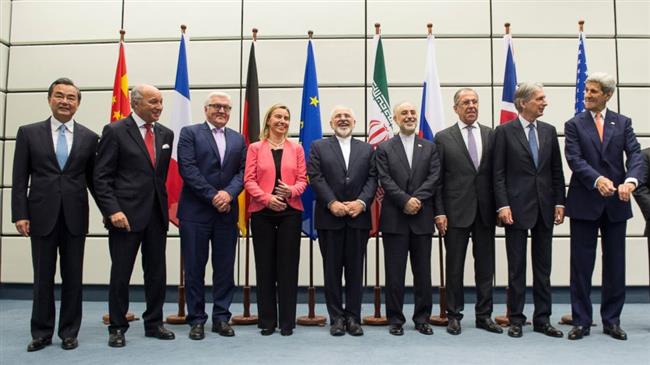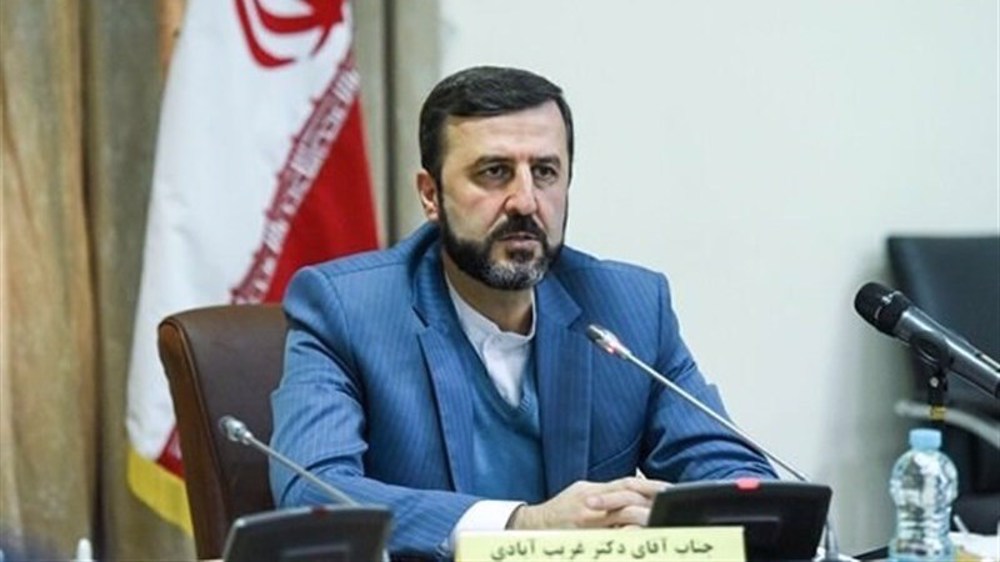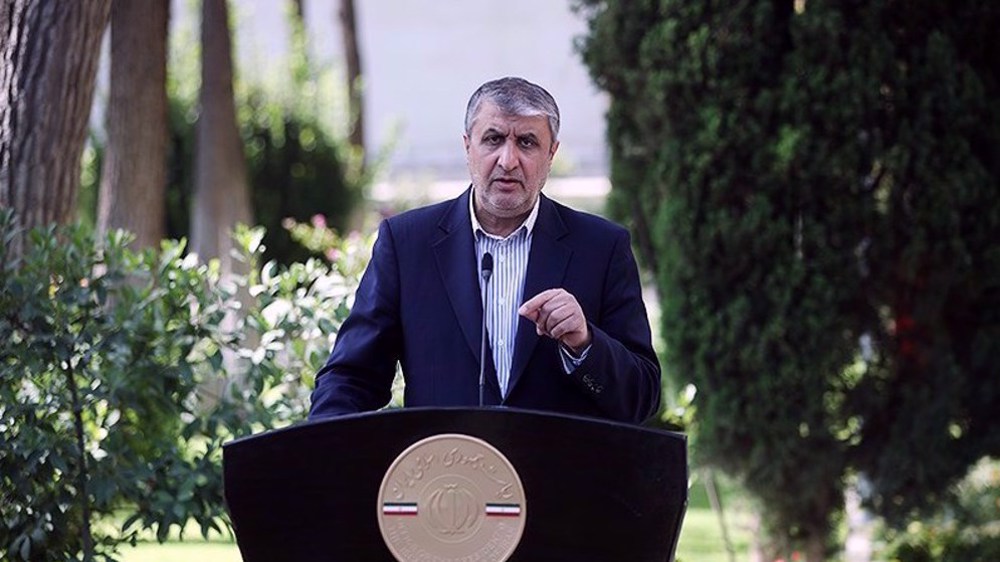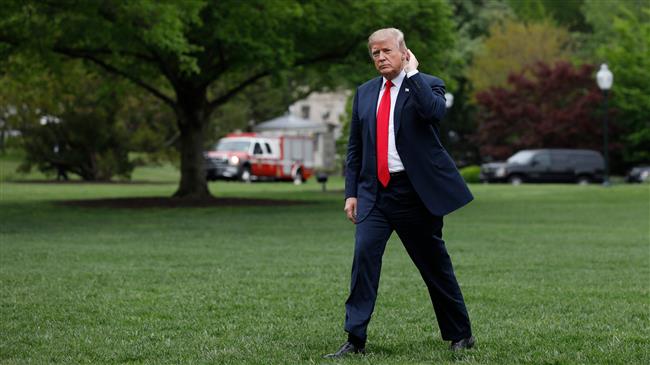Iran nuclear deal: Will Trump scrap results of multilateral diplomatic marathon?
US president Donald Trump is expected to announce his position on Iran’s nuclear deal amid global criticism of Washington’s threats to withdraw from the landmark accord achieved through an unprecedented marathon of international diplomatic efforts.
The US president is expected to announce on Tuesday whether to withdraw from the nuclear agreement, officially known as the Joint Comprehensive Plan of Action (JCPOA), reached between Iran and the P5+1, five permanent members of the UN Security Council – the United States, France, Britain, Russia and China – plus Germany.
The widely-expected announcement comes as European allies of the US, particularly the UK, are reportedly trying to convince the president to stay in the multilateral deal.
Under the JCPOA, reached under Trump's predecessor Barack Obama, Iran undertook to put limits on its nuclear program in exchange for the removal of nuclear-related sanctions imposed against Tehran.
Since Trump took office as US president in early 2017, America’s violations of the deal have intensified and Trump now seems determined to derail the agreement.
On January 12, the US president, who had fiercely spoken against the deal during his presidential campaign, reluctantly agreed to waive the anti-Iran sanctions that were lifted as part of the landmark deal and threatened to pull out of the JCPOA unless Congress and America's European allies help “fix” it by May 12.
All other P5+1 countries involved in the deal with Iran, including the United Kingdom, France, Germany, Russia and China, have reaffirmed their support for implementing the hard-earned international agreement which is also endorsed by the UN Security Council.
The dispute over Iran’s nuclear program originally arose in 2002 when the United States and some of its allies accused Tehran of trying to manufacture nuclear weapons.
The Islamic Republic has always insisted that its atomic program is merely for peaceful purposes and that the West is using the nuclear case as a pretext to put pressure on Tehran.
Since then, Iran and major world powers have been engaged in a campaign of diplomatic efforts unprecedented in the history of the world and held many rounds of intensive negotiations for over a decade in an attempt to find a solution for the crisis.
In June 2003, Britain, France and Germany kicked off nuclear negotiations with Iran but the US refused to take part. In October that year, Iran voluntarily suspended uranium enrichment and allowed snap inspections of its nuclear sites by the International Atomic Energy Agency (IAEA). However, the Islamic Republic announced its decision in February 2006 to resume enrichment after the IAEA voted to refer the country’s nuclear dossier to the UN Security Council.
Subsequently, the P5+1 group was formed in June 2006 when the United States, Russia and China joined the three EU countries in talks with Tehran.
From December 2006 till 2010, the UN Security Council imposed six rounds of tough nuclear-related sanctions against, while the US and the European Union were also imposing their own unilateral measures against the Islamic Republic.
In response, Iran sped up its nuclear work and increased the number of its centrifuges.
In an attempt to allay Western concerns, Iran, Turkey and Brazil signed a fuel swap agreement, called Tehran Declaration, on May 17, 2010, when talks between Iran and the P5+1 were showing little progress.
Under the declaration, the Islamic Republic agreed to ship 1200 kilograms of its low-enriched uranium to Turkey to be exchanged for 120 kilograms of 20 percent enriched nuclear fuel rods to power the Tehran research reactor for production of radioisotopes for cancer treatment.
The arrangement, however, failed to work due to heavy US pressure and the UN Security Council immediately imposed US-proposed sanctions against the Islamic Republic despite Iran's trust-building initiative.
In January 2011, nuclear negotiations between Iran and the P5+1 broke down and remained stalled for over a year.
By the time Hassan Rouhani became Iran’s president in August 2013, with his campaign promise of resolving the nuclear dispute through diplomacy, the Islamic Republic manufactured nearly 20,000 centrifuges from just a few hundred in 2002.
Iranian officials argued that sanctions had just boosted Iran’s nuclear program and led to production of more centrifuges.
A month later, Rouhani and former US president Barack Obama spoke by telephone in the highest-level contact between the two countries in decades.
America’s former top diplomat John Kerry and Iranian Foreign Minister Mohammad Javad Zarif soon launched a major new push to settle the atomic dispute.
Eventually, after twenty months of marathon negotiations between the top diplomats of Iran and the P5+1, the two sides announced their comprehensive atomic deal on July 14th, 2015.
Days later, as the international community was jubilant at the important diplomatic achievement, the UN Security Council unanimously endorsed the JCPOA.

The JCPOA which ended the long running dispute over Iran’s nuclear program was hammered out despite heavy pressure from pro-Israeli and Saudi lobbies in the United States.
Under the deal, Iran agreed to voluntarily limit the number of centrifuges at its Natanz enrichment facility to 5,060 for ten years.
The country’s Fordo enrichment facility was also turned into a nuclear, physics and technology centre. The over one thousand centrifuges there now only produce radioisotopes for use in medicine.
Iran also reduced its uranium stockpile by 98% to 300 kilograms and pledged to keep that level for 15 years. The Islamic Republic also committed to keeping the level of nuclear fuel enrichment at 3.67 percent.
Moreover, Tehran undertook to redesign its heavy-water reactor near the city of Arak. Based on the JCPOA, Iran is not allowed to build heavy-water reactors for 15 years.
In return for Iran’s measures, the P5+1 group agreed to lift all nuclear-related sanctions. Subsequently, part of Iran’s frozen assets was released and the country was permitted to resume selling crude oil on global markets and reconnect to the global financial system.
Tehran also received assurances of cooperation in a variety of industrial and technology fields.
The JCPOA recognizes the IAEA as the authority tasked with verifying Iran’s compliance and relies on stringent inspections by the agency, including site visits, remote monitoring and satellite photography.
The IAEA has so far produced ten reports confirming that the Islamic Republic has fully complied with its obligations.
Experts say Trump is now facing a dilemma. On the one hand, he seeks to pull America out of the deal in an attempt to fulfill one of his key presidential campaign promises and also please Israel and Saudi Arabia, as the strong opponents of the JCPOA.
On the other hand, the US president faces the challenge of getting the US isolated among its allies, who have long been critical of the Washington’s lack of commitment to the multilateral landmark deal and have repeatedly warned Washington against withdrawing from the agreement.
Zarif said on Monday any possible US withdrawal from the JCPOA “will show that the Americans are isolated and are no longer trustworthy for international interactions.”
In late April, Macron made a visit to the US mainly to persuade Washington to stay in the JCPOA. Following the meeting, the French president told reporters that he thought Trump would decide to exit the deal.
Macron noted that a new deal is needed with Tehran which should incorporate three additional elements, namely Iran's ballistic missile program, the country’s regional influence and what happens after 2025 when Tehran will restart part of its nuclear program under the accord.
Iranian leaders, however, have repeatedly stressed that the JCPOA is non-negotiable and dismissed the possibility of continuing with the agreement solely with America's European allies.
Meanwhile, Israeli Prime Minister Benjamin Netanyahu has once again accused Iran of continuing to hide and expand what he called its nuclear weapons program.
On May 1, he presented what he alleged was “new and conclusive proof” of violations, and claimed Iran had lied about its capabilities at the time of the agreement’s signing.
A day after Netanyahu’s allegation, the UN nuclear agency reiterated in a statement that it had “no credible indications of activities in Iran relevant to the development of a nuclear explosive device after 2009,” citing its assessments from 2015.
Following Netanyahu’s allegations, EU foreign policy chief Federica Mogherini also said any claims on the Iranian nuclear program should solely be assessed by the IAEA.
British Foreign Secretary Boris Johnson also reaffirmed his country’s support for the landmark nuclear deal, noting that the JCPOA was “based on tough verification.”
Russia and China, as the other signatories to the JCPOA, have warned against efforts to scrap the landmark accord and pledged to continue to honor their commitments under the deal.
The Year That Was: Pro-Palestine campaigns that disrupted US-Israeli war machine in 2025
‘You may be surprised’: Iran’s top legislator warns enemies about scope of future defensive measures
VIDEO | Press TV's news headlines
VIDEO | Tunisians reject Israel’s recognition of Somaliland
VIDEO | Tunisians react emotionally to Abu Obeida’s martyrdom
US bears full responsibility for consequences of any fresh aggression against Iran: FM
VIDEO | Sudan’s healthcare system nears collapse amid conflict
VIDEO | Gazans struggle to survive as they welcome New Year















 This makes it easy to access the Press TV website
This makes it easy to access the Press TV website